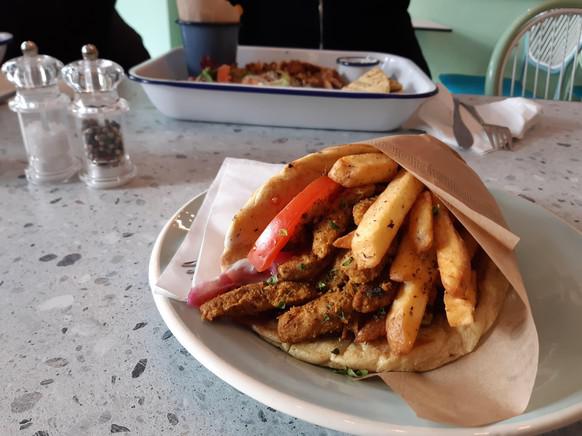
Wadi Wasit is a source of forgetting.We reach them on a glowing hot August day.Half of a more than 1200 km long walk from Dschidda to Jordan, perhaps the first to be taken for generations, is behind us.The Hedschas - a crossroads on which Arabia, Africa and Asia meet - is one of the most stories -rich corners of the ancient world.But I don't know any area that is more memory than this.
The long way into the world
60.000 years needed modern people to colonize the earth from Africa.The national geographic reporter Paul Salopek follows this track.From Ethiopia to Tierra del Fuego.34.000 kilometers.For seven years.
More about the "Out of Eden Walk" project in his blog.
A small, bottomless source in Hedschas: a white porcelain cup.Dark, strong coffee in it.Three eloquent women fill up the cup in one fort.Saudi Arabia, they say, is a diverse human mosaic.With different regions and cultures.The women also emphasize that no region in Saudi Arabia today as independent and proud as the area that has since 7.Century the sacred cities of Mecca and Medina hold - the lost kingdom of Hedschas.
On the one hand, a sacred landscape, with sacred cities that were forbidden for non -believers for a long time.On the other hand, the most liberal region of Saudi Arabia: a melting pot of migration, dazzling by influences from Asia, Africa, the Levant and a hundred other places - the California of Saudi Arabia.
"We have lost so much in 50 years"
Salma Alireza, a traditional sticker, says: "In the past, women wore bright red and blue clothes in public.That was the tradition.But after 1960 life changed.Oil money flowed into the country.The modernization went too quickly.We have lost so much in 50 years! "

And it's true.The women sit at the table unpainter.They wear blouses and pants.The house in which we talk is elegantly built and chic, minimalist, globally decorated.And outside, on the streets of Dschidda, there are art galleries, cafés, promenades, museums - it is the cultural hub in Saudi.
Nomads of Hedscha's life in cities
We stop almost 500 kilometers north of Dschidda.A car is approaching over a level of glittering salt.A Toyota Hilux, the iron camel of modern Bedouins.We are an event.The famous nomads of Hedscha now now live in cities and suburbs, offices, army bearing.But stay a few hard -boiled people.
One of them rises from the Toyota, an old man in the stained gray Thawb, the classic robe of Saudi men.He brings us a gift."This is so customary with us," he says, describing a wide arc over the desert with his callus hand.
Razed to the ground
Once built out of necessity, the sources in the old hedschas to places of beauty and contemplative consideration faded.The fact that the Hedschas in the non -Muslim world is still romantically transfigured is due to the caravan foreign chronicler.
They saw cities built from shiny white coral blocks on the Red Sea, whose round arch doors and shutters shone sea green and nomadic blue.They galloped on camels from a fortified oasis to the other, with wild -haired men, the Bedouins, which they admire in their rough way.This literary hedschas, if it existed, has long since disappeared under American suburbs and shopping miles.
"We gave our past for material prosperity," complains Ibrahim, a water engineer in the port of Alwadschh."My grandfather's 200 -year -old coral stone house?.The lighthouse of our city that was seen from a distance of 20 kilometers?rubble.Nobody takes care of it.It has no economic value."
From tent to Twitter
It is noteworthy that the loudest complaints about the disappearance of the inheritance of Muslims outside of Saudi."It is difficult to move young Saudis to deal with her own history," says Malak Mohammed Mahmoud Baissa, the mayor of Dschidda's remaining old town.Breakneck economic change.modernization.From tent to Twitter.To be glass scratches in barely three generations.So it must have been received in Europe during the industrial revolution.
After six months of hiking together, I say goodbye to my companions Ali and Awad.I cross the border from Saudi Arabia to Jordan.I only wear little with myself.A shoulder bag with notebooks, held together by rubber bands.1130 kilometers words.
Taken from:
National Geographic, issue July 2014, from now on for 5 euros at the kiosk.There you will find the unabridged reportage.More information at www.National Geographic.de/Salopek
I reach a modern tourist location.Nobody will pay attention to me.I will be aware that women also drive here.I go to a shop and buy a bottle of filtered water: a small plastic source, a man made by humans.







